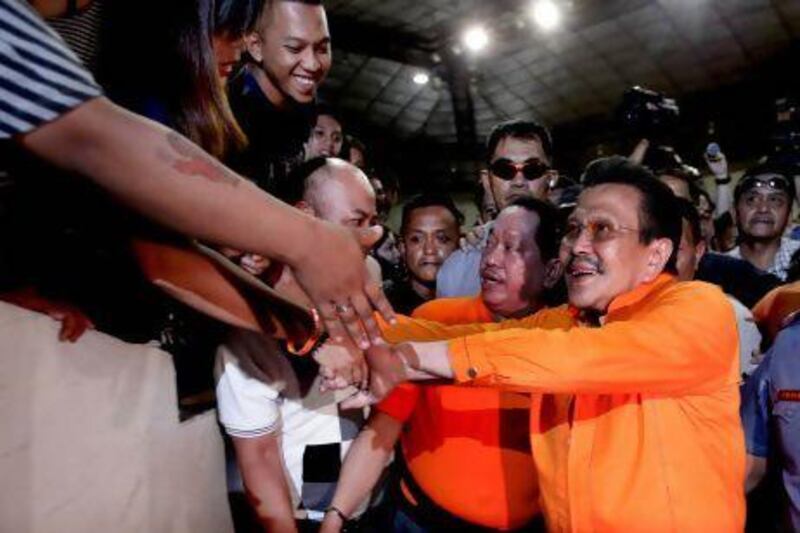MANILA // The former president of the Philippines, Joseph Estrada, was elected as the mayor of Manila yesterday, his first ballot win since his removal in a 2001 anti-corruption revolt.
Mr Estrada's was among a host of familiar names, including the former first lady, Imelda Marcos, to score wins in Monday's congressional and local elections.
About half the votes have been counted so far and, if they accurately reflect the whole, the president, Benigno Aquino, will have enough congressional support to push through his policies in his last three years in office.
The presidential spokesman, Edwin Lacierda, said Mr Aquino had described the election as a referendum on his administration.
"It seems clear that our countrymen have spoken overwhelmingly to confirm and expand the mandate for reform and change that they first granted in 2010 to president Aquino."
Mr Estrada is a leader of the opposition coalition, but Mr Lacierda said he and Mr Aquino remain "good friends" and will be able to work together.
Mr Estrada, 76, capitalised on his film-star popularity, particularly among the poor, and promised to reverse the urban decay of the historic capital along Manila Bay. Manila was once a lively tourist spot, but the streets have become neglected and many residents complain of crime.
"I have no other desire in the final years of my life than to offer my experience in public service, to give everything I can to uplift the poor," Mr Estrada said after he was proclaimed the winner.
"Manila has been left behind by its neighbours. We will revive the vigour of Manila that we can be proud of."
Mr Estrada, popularly known as Erap, had served for nearly 20 years as mayor of nearby San Juan city, senator and vice president. After his presidential term was cut short by the 2001 revolt, he was convicted of corruption, then pardoned.
Mr Estrada, who finished second in the 2010 presidential election, could use his new position as a springboard for another attempt at the presidency.
He defeated the incumbent mayor Alfredo Lim, an 83-year-old former Manila police chief who once served in Mr Estrada's cabinet as interior secretary.
During Mr Lim's term of office, eight Hong Kong tourists were killed by a hostage-taker in 2010 in a bungled police rescue. An investigation found him liable and negligent.
As proof that political dynasties and familiar names continue to monopolise political life in the Philippines, Ms Marcos, 83, won her second consecutive term as congresswoman of Ilocos Norte province. Her daughter Imee ran unopposed and was re-elected governor.
Mr Aquino's predecessor, Gloria Macapagal Arroyo, is in hospital detention while facing corruption charges but still appears headed to a second term as a representative of her northern home province of Pampanga.
Her son, Dato Arroyo, is ahead in the congressional race in Camarines Sur province south-east of Manila.
Twelve of the 24 Senate seats were up for election and, if early results hold up, Mr Estrada's son JV Ejercito will be among the winners, joining a half-brother who is already a senator.
Others among the top 12 for senate seats include Mr Aquino's cousin, Benigno "Bam" Aquino. Two-thirds of the senate candidates in position to win belong to one of the country's dominant elite political families.
The elections commission chairman, Sixto Brillantes, said he expects a turnout of 70 per cent out of more than 52 million registered voters. He said that most, if not all, of the senate winners will be proclaimed by late today.





